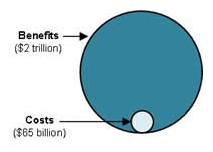The Environmental Protection Agency (EPA) yesterday released its Second Prospective Report examining the benefits of the Clean Air Act amendments from 1990 up to 2020. The study confirms that the EPA’s clean air protections are not only vital for safeguarding the physical health and longevity of Americans, they are also extremely good for our economy. While the cost of implementing the 1990 Clean Air Act Amendments was just $65 billion, the direct benefits from these protections are projected to reach almost $2 trillion for the year 2020.
In 2020, the study projects the Clean Air Act will prevent more than 230,000 cases of premature mortality, 200,000 heart attacks,
17 million lost work days
and 2.4 million asthma attacks.
From the EPA’s findings:
This net improvement in economic welfare is projected to occur because cleaner air leads to better health and productivity for American workers as well as savings on medical expenses for air pollution-related health problems. The beneficial economic effects of these two improvements alone are projected to more than offset the expenditures for pollution control.
Once again, it is clear that reducing dangerous pollution pays for itself, many times over.
But don’t expect the anti-science crusaders who control the Republican party agenda to feel persuaded by plain facts and economic data. Science deniers like Senator James Inhofe (R-OK) and House Energy and Commerce Committee Chairman Fred Upton (R-MI), remain steadfastly in favor of slashing the EPA’s budget and undermining the very protections that deliver these economic benefits and save American lives.
Unless it benefits Koch Industries or ExxonMobil, these GOP “leaders” aren’t interested in hearing it.
In fact, Rep. Upton suggested recently that EPA administrator Lisa Jackson ought to reserve a permanent parking spot outside the Rayburn Office Building where she’s expected to face a barrage of hearings to defend her agency’s budget and listen to plenty of GOP anti-science grandstanding that will waste taxpayer money and certainly won’t save any American lives. Upton even offered to “paint the curb yellow” for Jackson’s parking ease. What a gentleman.
Guess where Lisa Jackson spent her afternoon today? Yup, parked at the curb in front of another hearing to defend the EPA’s already shrinking budget in front of the Senate Environment and Public Works committee – a budget request for EPA that President Obama proposes to slash by 13 percent from current levels, no doubt to show that good ole “bipartisan” polluter-friendly spirit.
Just in case her “friend” Sen. Inhofe had not yet read the latest data confirming the cost-effectiveness of EPA’s work to safeguard public health and the economy, Ms. Jackson summed up the consequences in plain language for him and the rest of the committee in her prepared testimony:
Well said. Here’s another way of putting it: slashing the EPA budget right now would be akin to cutting back on one of America’s best performing investments, our cheapest insurance policy.
Surely the economics experts in the GOP can understand that? No? How about putting it this way: The lives they save by funding EPA might just be their own. After all, air and water pollution affect everyone, even science deniers.
Subscribe to our newsletter
Stay up to date with DeSmog news and alerts







